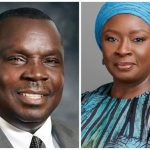...To get all news updates, Join our WhatsApp Group (Click Here)
Also Join our WhatsApp Channel (Click Here)
The recalcitrant attitude of debtors who take depositors funds by way of loan facilities with no intention to repay has once again come into public focus with the recent dispute between the Estate of the late Chief Sunny Odogwu, and his related companies.
While it is not in dispute that a facility was taken from the bank to finance a hotel project at 31-35, Ikoyi Crescent, Ikoyi, Lagos, the said facility is yet to be repaid.
The impression being created by the Estate of the late Chief Odogwu and his related companies that they can take depositors funds to finance projects and rather than repay such funds, they would make false claims to the ownership of the assets of the debtors as inheritance to be shared is a vivid reminder of the era of failed banks in the country.
The dubious attempts by the Estate of the late Sunny Odogwu to rewrite the terms of the facilities is not only a show of shame but a clever attempt by the family to inherit dubious assets gotten from depositors’ funds which does not form part of the estate and as such should not be allowed.
It would be recalled that the defunct Diamond Bank Plc, an iconic bank comparable to Eastern Nigeria’s African Continental Bank (ACB) almost went under due to recalcitrant borrowers and the bank was rescued by Access Bank Plc.
Unfortunately for the Estate of the late Sunny Odogwu and his related companies, the facts of the matter, terms of the loans and the dispute has been litigated and pronounced upon by the Federal High Court and the Odogwu Family had the opportunity to present their own side of the story which they did before Hon. Justice Saliu Saidu of the Lagos Division of the Federal High Court in suit number: FHC/L/CS/1633/14, in November 3, 2015.
Delivering judgment in the suit, Hon. Justice Saidu held that the first to third defendants were in fundamental breach of the contract for the financing of the construction of the Luxury Collection Hotels and Apartments, having admitted, “Indebtedness to the plaintiff in the sum of N10, 252,315,567.28 on the project finance facility as at December 20, 2011.”
Additionally, the learned trial judge held that the first to third defendants have not produced before the court any evidence that any of the conditions for the grant of the facility was waived or demonstrated to the court how they liquidated their indebtedness.
His words: “With all the facts before me, I am satisfied that the first to third defendants who have admitted indebtedness has not shown how the indebtedness was liquidated.
Flowing from these grounds, Justice Saidu made the following consequential order: “Judgment is entered in the sum of N26, 229,943,035.22 jointly and severally against the 1st to 3rd defendants being the outstanding sum as at September 30, 2014 advanced by the plaintiff for the 1st to 3rd defendants’ project which sum has remained unpaid despite several demands.
“That leave is granted to the plaintiff to foreclose and sell the said property situated at 31-35 Ikoyi Crescent, Ikoyi, Lagos and to deposit the proceed of the sales into the 1st defendant’s account kept with the plaintiff towards the partial satisfaction of the judgment sum against the 1st to 3rd defendants.
“That leave is granted the plaintiff with the supervision of the Court’s Registrar to sell property situated at No 31-35 Ikoyi Crescent, Ikoyi, Lagos being the security for the sum of N26, 229,943,035.22 advanced by the plaintiff to the 1st to 3rd defendants for the development of the project called Luxury Collections Hotels and Apartments, the repayment of which facility, the 1st to 3rd defendants have failed, refuse otherwise neglected to make despite several demands.”
It was against this background that the Estate of the Late Odogwu entered into a settlement agreement in May 2019 on the matter.
The key parts of the settlement include the following: “The defendants (the Estate of the late Sunny Odogwu and his related companies) agreed to sell a property described therein as the (Berendo Property”) in Los Angeles and to pay the sum of $11,111,111.11 within (60) days from the date of the settlement agreement to the Bank, failing which, the ownership of the Berendo property was to be assigned to the Bank, and the defendants also agreed with the bank in satisfaction of the outstanding settlement amount after receipt of the net proceeds of the sale from the Berendo property to assign such additional properties directly to the bank by way of an agreed asset swap arrangement subject to the terms of this settlement agreement.
Also, the defendants agreed to provide the bank with all the original documents pertaining to certain properties after the execution of the settlement agreement and undertook to execute and provide all documents required to perfect the legal interest of the Bank in such properties and also perfect the asset swap for the purpose of liquidating the outstanding settlement amount with the bank and shall provide such warranties and representations including without limitation, clean, undisputable and unencumbered title with quiet and peaceful possession. All these shall be achieved within seven days from the date on the settlement agreement.
Furthermore, the defendants failed to facilitate/conclude the sale of the Berendo property, hence the sum of $11,111,111.11 has not been received by the bank in line with the settlement agreement. Consequently, the defendants have failed and refused to assign the Berendo property in Los Angeles to the Bank. Rather, the defendants compromised the property at Los Angeles without paying the agreed sum to the bank.
Furthermore, the defendants refused to hand over the Dubai property to the bank in line with the settlement agreement. The defendants have refused to grant vacant possession to the properties at Kirikiri as well as the Dubai property till date in line with the settlement agreement.
Recalcitrant debtors negatively impact the critical banking sector and defeat the essence of granting such facilities to aid business growth.
Regrettably, the Estate of the late Sunny Odogwu instead of repaying the facility in line with the terms of the settlement have apparently opted for assets stripping and have failed to comply with the settlement agreement.
The idea or impression that the beneficiaries of the estate of the late Sonny Odogwu can lay any claim of ownership to an asset acquired from depositor’s funds of a financial institution as forming part of the estate when they are aware that the underling facility has not been repaid is not only sad but actionable. And this is exactly what the Failed Bank Act seeks to prevent.
At the end of the day, depositor’s funds are savings by hard working Nigerians who believe in the financial system.
Banks are merely custodian of this funds and as custodians, when banks grant credit facilities to customers to finance and fund assets and projects, such assets do not form part of the estate of the customers for the beneficiaries to share and leave luxurious lifestyles at the expense of the depositors, until such facilities are fully repaid.
Access Bank Plc has remained resolute in its determination and in its typical manner of dealing with chronic and recalcitrant debtors, has indicated that it will continue to deploy every legal available resource to ensure that this debt is fully recovered.
This is why dodgy and chronic debtors like these must steer clear of accessing facilities from Access Bank Plc.
You can get every of our news as soon as they drop on WhatsApp ...To get all news updates, Join our WhatsApp Group (Click Here)
Also Join our WhatsApp Channel (Click Here)

















